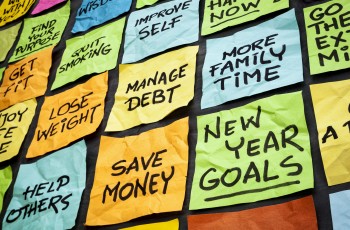Do New Year’s Resolutions Really Work?
By: Chris Putman | Category: Education | Issue: January 2020

“Sticking with it is the key. It is easy to do the old thing, the problematic behavior. The challenge is to push on through. Self-control and perseverance is the big hang-up for people in our culture.”
New Year’s Day is not just another day, like a Monday, the start of a new week, or the first day of a month. It is weighted more significantly in folk’s minds because they know it is the mark of a new year, the door to a fresh start. Disappointments of the past year fall away while the slate is wiped clean and a new year holds promise.
To add more pressure, this day must deliver life-changing results. It’s the day some stop smoking or for others the first day in a path to dramatic weight loss. It’s that day when people launch into a better version of themselves. That’s a tall order for one day to deliver, isn’t it?
Peter Economy, The Leadership Guy, @bizzwriter, in “10 Top New Year’s Resolutions for Success and Happiness in 2019” provides a resolution list he has pieced together from a survey of 2,000 people. Here are the top resolutions for the year.
- Diet or eat healthier (71%)
- Exercise more (65%)
- Lose weight (54%)
- Save more and spend less (32%)
- Learn a new skill or hobby (26%)
- Quit smoking (21%)
- Read more (17%)
- Find another job (16%)
- Drink less alcohol (15%)
- Spend more time with family and friends (13%)
So how do these goals generally work out? Statically it usually does not go so well. According to Economy, while 60% of individuals make a New Year’s resolution, only 8% see it to completion. The others can’t even hang on to the end of the month.

How discouraging. How can someone hope to have success with the odds stacked against them?
In “New Year’s Resolutions Don’t Last. Do This Instead.” contributing writer for Forbes.com Naz Beheshti states resolution-makers underestimate the length of time it takes to break a bad behavior or adopt into a lifestyle a good habit. Most have heard it takes 21 days to change behavior. Not so much. Research shows it takes about 66 days before that is fully embedded into a routine. Perhaps a little more patience should be applied to behavioral changes.
Regent University second-year jurist doctorate student Jessica Sherwood is a go-getter. Her weight is on target; no self-control problem there. She exercises regularly; she’s got that one conquered. She achieves her major life goals; she’s not a quitter. Does she have the corner on the resolution market? Yes and no. She makes resolutions every December but admits she keeps some of them, but not all. When she doesn’t, she’s quick to fall into self-criticism.
“Normally, I will reflect on my list every couple of months as a reminder,” Sherwood said. “When I see I failed on some of my goals after only a few months, I often feel very discouraged. I start to tell myself I am not enough, or I don’t have what it takes to be disciplined, consistent, successful and smart. Instead of celebrating progress, we mourn failure.”
Year after year of disappointment can be tough on a person’s self-esteem. Perhaps more understanding is needed about the approach taken for change.
Oral Roberts University Behavior Sciences Chair Randall Feller has a Ph.D. in Counseling Psychology and 34 years of expertise under his belt. He has some solid wisdom to consider. He feels much of the problem of behavioral change comes from unreasonable expectations and not being realistic about the work involved to get results.
“With a culture of wanting everything fast—fast food, fast internet—we want quick solutions, but the payoff is at nine weeks,” Feller said. “Sticking with it is the key. It is easy to do the old thing, the problematic behavior. The challenge is to push on through. Self-control and perseverance is a big hang-up for people in our culture.”
He understands change takes some heavy lifting but suggests goal-setters need to focus on their long-term goal, not immediate results.
“They have a little bit of self-control when they get a lot of positive praise and good feedback, but they have to stick with it for a while when no one is noticing. That’s more difficult for people in our contemporary culture, but it is absolutely essential if they are going to change their behavior.”
So should individuals give up resolutions altogether, or are they good for personal growth?
“I think it’s a good idea, but not just at New Year’s,” Feller said. “A lot of people busy themselves too much and don’t reflect on their own behavior. There is a feeling of guilt; it’s called cognitive dissonance. When people look at their current behavior and their ideal self and see the disconnect between the two, it creates that sense of guilt. I think they should spend much more time in self-reflection and use those motivators for change. They are going to have to persevere for nine weeks before it starts paying off and becoming easy.”
Negative reports don’t deter Sherwood. She plans to continue to make resolutions every year and give herself space and time to reflect and inspire for what’s ahead. She says if she fails, she’s going to take time to recalculate, step back from her goals and ask herself why she’s having a difficult time fulfilling them. Sherwood believes in reflection and healthy introspection. She’s even going to ask those around her she trusts to speak to what they see from their perspective.
“To me, a big part of resolutions is setting a vision for the upcoming year,” Sherwood said. “The goal provides a benchmark—a bullseye on the target—of what I want to do and whom I want to become. Often even on our ‘failed’ items, we did make progress. For the items I accomplished, I celebrate. I am proud of how I saw steps toward newness in my life.”
Subscribe
For Free!



